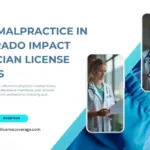Malpractice cases can reshape a medical career. In North Carolina, legal issues tied to malpractice often extend beyond courtrooms. They reach licensing boards, professional reputations, and future credentialing.
Understanding Malpractice in North Carolina
Malpractice in North Carolina follows defined legal structures. A physician must be proven to have deviated from accepted standards. If harm results from that deviation, the case may qualify as malpractice. State regulations allow patients to seek compensation through legal claims.
The North Carolina Medical Board monitors such claims closely. These claims can influence decisions about a provider’s license. Even dismissed lawsuits may raise concern during investigations.

Reporting and Disciplinary Oversight
North Carolina law requires reporting of malpractice settlements and judgments. Hospitals, insurers, and practitioners submit these reports to the Medical Board. The Board uses this data to identify patterns and ensure public safety.
Not every report results in discipline. However, repeated incidents or serious allegations often trigger reviews. These reviews assess conduct, risk, and future accountability.
Impact on Medical Licensing
Licensing boards maintain authority over disciplinary action. Malpractice in North Carolina can lead to probation, suspension, or license revocation. Consequences depend on the nature of the claim and supporting evidence.
Boards also consider transparency. If providers fail to report malpractice history or misrepresent facts, penalties increase. Integrity plays a vital role in maintaining trust.
License Renewal and Malpractice Disclosures
License renewal involves disclosure of any malpractice history. North Carolina licensing applications require full transparency. Omitting such information may result in denial or delay.
Renewal decisions also weigh ongoing competency. Malpractice in North Carolina may suggest performance issues. Boards often request additional documentation, evaluations, or practice monitoring.
Credentialing and Hospital Privileges
Hospitals review malpractice records before granting privileges. This process, known as hospital credentialing by state, varies across facilities. Still, malpractice is a common review factor.
North Carolina hospitals align credentialing processes with board actions. A restricted license may limit access to hospital roles. In some cases, privileges may be suspended or denied.
National Reporting and Interstate Effects
Serious malpractice-related actions are reported to national databases. These include the National Practitioner Data Bank (NPDB). This record follows providers across states.
Licensing applications in other states include malpractice history checks. A record from North Carolina affects portability. Some states require additional explanation or compliance steps before approving a license.
Insurance Implications
Malpractice in North Carolina can raise insurance premiums. Liability carriers assess risk based on claim frequency and outcomes. A provider with multiple cases may face higher rates or policy changes.
In extreme situations, insurers may deny coverage. This affects not only financial protection but also eligibility for hospital work and licensing in some jurisdictions.
Influence on Career Opportunities
Employers conduct background checks, including malpractice history. Competitive positions often favor clean records. Malpractice in North Carolina may not disqualify a candidate, but it can delay offers or limit roles.
Some organizations impose internal review panels before hiring. This layer of scrutiny stems from the need to protect patients and institutional reputation.
Preventive Strategies to Protect Licensing
Strong documentation reduces legal risk. Clear communication improves patient satisfaction. Early error recognition and ethical handling of complications can prevent escalation.
Educational programs also help. Risk management courses and continuing education show dedication to improvement. Boards often view such efforts favorably when reviewing malpractice history.
Physician Licensing Services in North Carolina
Professional support improves license protection. Physician licensing services assist with complex applications, renewals, and compliance issues. These services often include malpractice disclosure guidance.
In North Carolina, expert licensing support can ease the burden of managing fallout from legal claims. This includes preparation for board inquiries and assistance in fulfilling remediation requirements.
Reinstatement After Disciplinary Action
If a license is suspended due to malpractice, reinstatement is possible. The North Carolina Medical Board outlines steps for restoration. These steps may include practice limitations, evaluations, and reporting.
Physician licensing services help navigate reinstatement. They prepare required documentation, manage deadlines, and facilitate communication with board authorities.
Hospital Credentialing by State: North Carolina’s Standards
Hospital credentialing evaluates qualifications, licensure, and malpractice history. Each facility applies standards based on state and institutional policy. In North Carolina, credentialing committees may request case details and board findings.
A clean credentialing file supports career stability. Addressing issues proactively improves approval odds. Reputable licensing services assist with credentialing preparation and response.
Continuing Education and Compliance
Physicians in North Carolina must complete continuing education. These courses support skill development and regulatory awareness. When malpractice occurs, additional education may be mandated by the Board.
Completion of such requirements reflects responsibility. Licensing boards use this data to evaluate rehabilitation efforts. A strong compliance history can ease future reviews.
Long-Term Effects of Malpractice Cases
Malpractice in North Carolina creates long-lasting records. Even resolved cases remain visible in national and state databases. These records influence future credentialing and employment.
Managing long-term impact involves strategic documentation and licensing support. Regular updates to personal records, education logs, and practice evaluations help maintain compliance and readiness.
Legal Support and Medical Licensing
Legal counsel assists during malpractice cases. Attorneys defend against claims and negotiate settlements. However, they also provide guidance on reporting obligations to licensing boards.
Physicians often coordinate with licensing consultants and legal advisors. This team approach ensures compliance and strengthens defense in board reviews.
Online Reputation and Public Perception
Malpractice in North Carolina may appear in public databases or news articles. These listings impact public trust and digital reputation.
Licensing services can offer public relations guidance. Rebuilding trust may involve transparency, updated profiles, and evidence of professional growth. Patient communication also plays a role in managing perception.
Monitoring and Self-Auditing
Self-auditing helps physicians track compliance and prevent issues. Regular review of patient feedback, charting, and outcomes supports professional standards.
Monitoring tools can alert potential risks. Early detection allows for corrective action before issues become licensing threats. Strong internal systems reduce the likelihood of malpractice.
Role of Licensing Boards in Physician Oversight
Boards in North Carolina protect public safety. Malpractice is one of many signals used to assess physician performance. Actions range from letters of concern to license suspension.
Understanding board protocols improves preparedness. Licensing professionals can interpret regulations and assist with required documentation.
The Value of Expert Licensing Guidance
Navigating malpractice impact requires more than legal support. Licensing professionals offer tailored strategies to protect credentials.
Physician licensing services ensure that all filings are timely and accurate. This reduces delays, errors, and risks associated with non-compliance.
Conclusion
Malpractice in North Carolina can affect licensing status, career options, and professional standing. Each case introduces scrutiny from medical boards, insurers, and hospitals. Early action, education, and expert support help manage this risk.
Licensing professionals, compliance education, and credentialing preparation all play critical roles. With the right strategies, medical professionals can recover, rebuild, and move forward.







